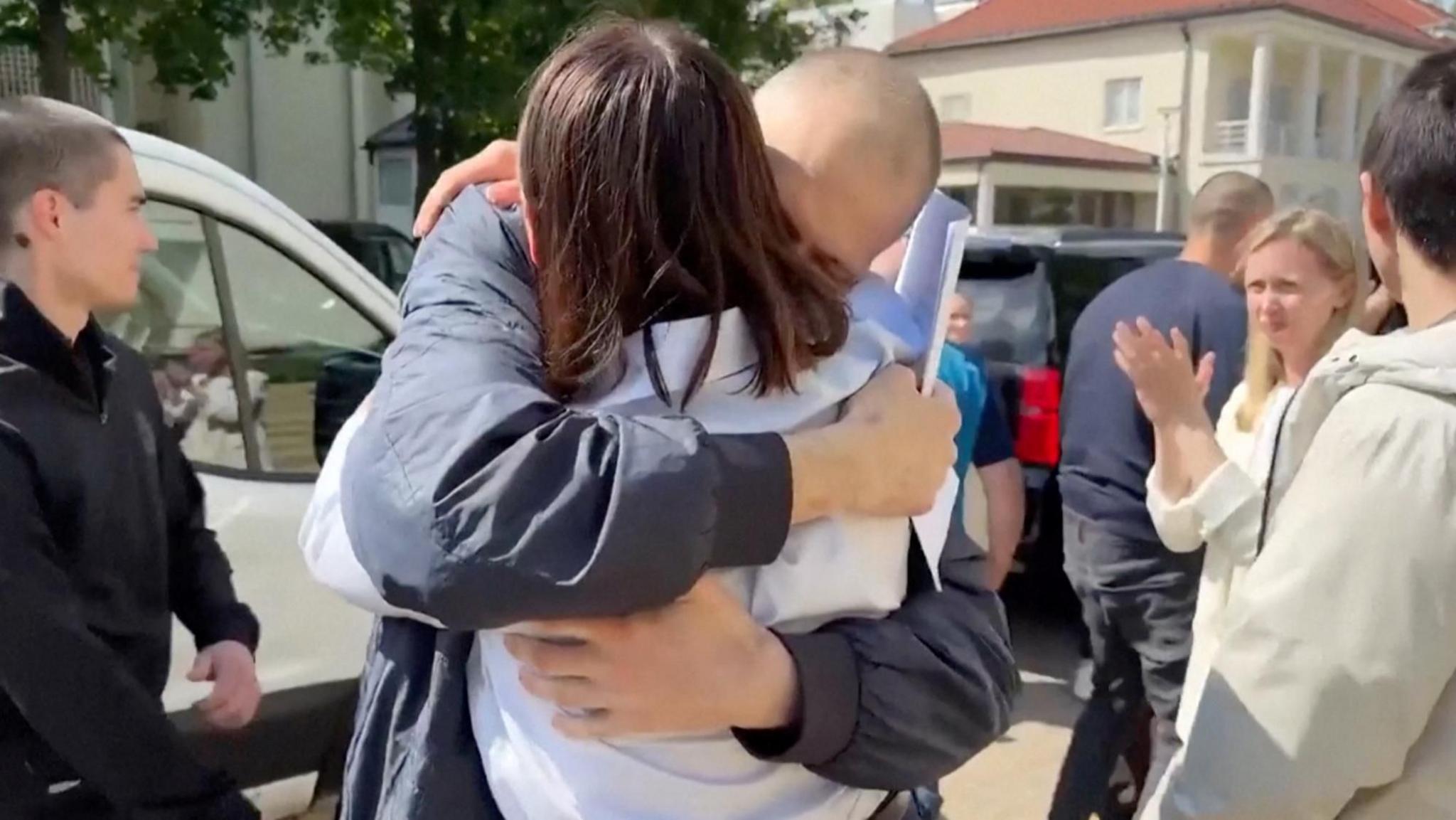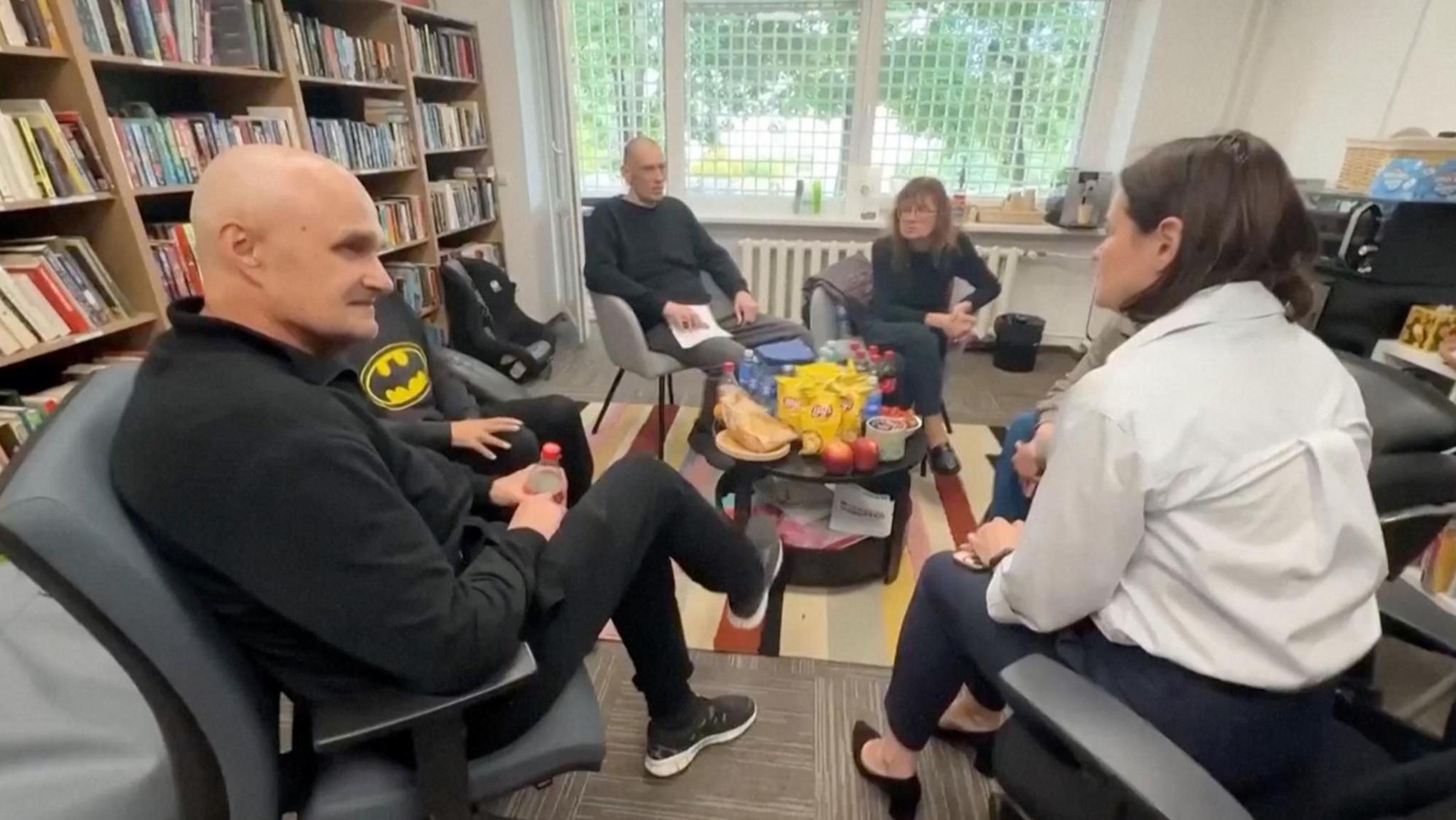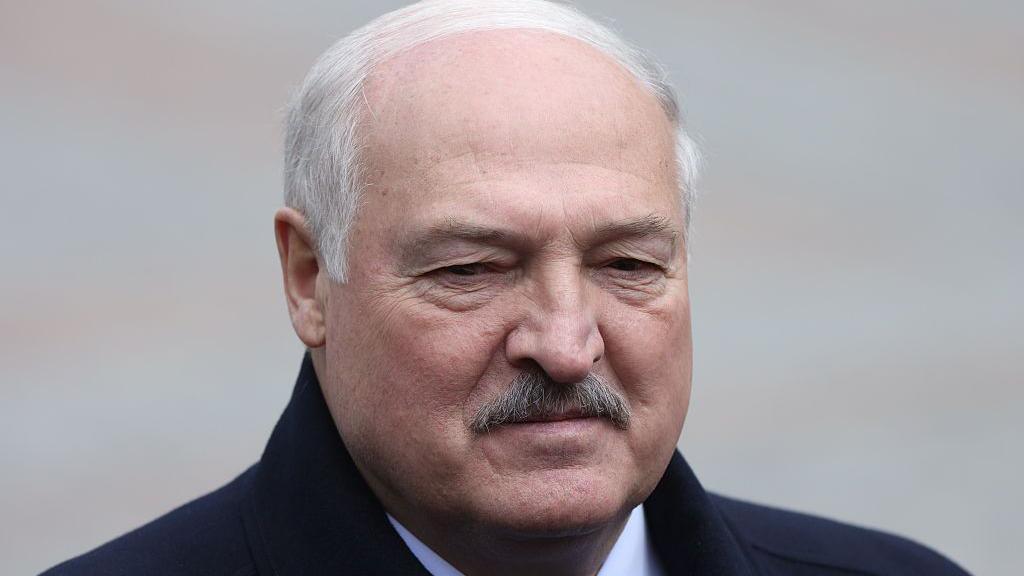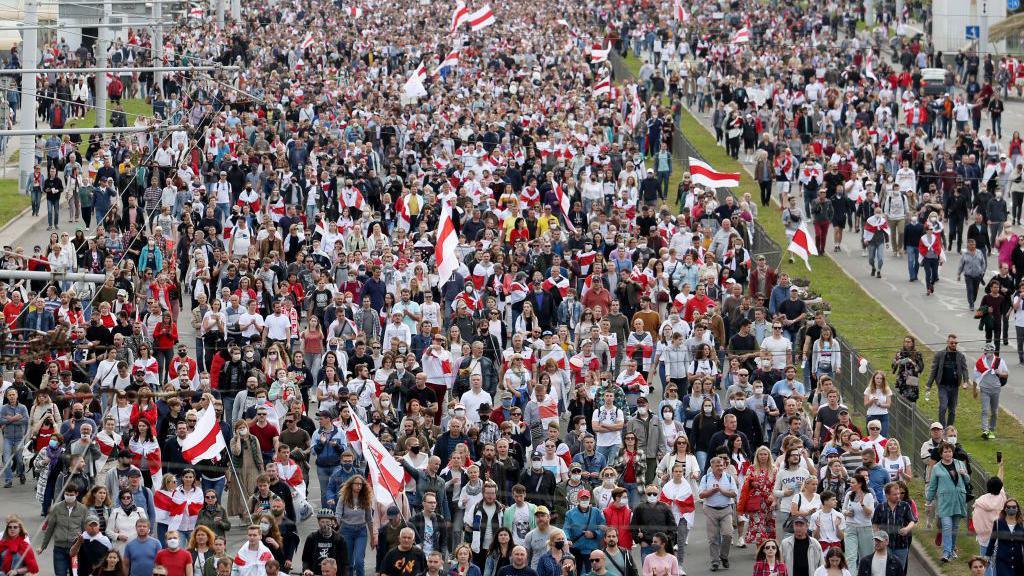Belarus opposition leader's husband freed from prison

- Published
The husband of Belarusian opposition leader Svetlana Tikhanovskaya has been unexpectedly released from prison in Belarus, along with 13 other political prisoners.
Sergei Tikhanovsky - an opposition activist himself - has been moved to Lithuania and reunited with his wife, who is living in exile in capital Vilnius, after five years in prison.
Svetlana Tikhanovskaya announced her husband's release by posting a 10-second video of their first hug since 2020. She said it was "hard to describe" the joy in her heart.
The sudden release came as US special envoy Keith Kellogg visited Minsk, Belarus' capital, on Saturday and held a meeting with the country's authoritarian leader Alexander Lukashenko.
In a statement on X, the Lithuanian foreign minister said 14 political prisoners were released and receiving care in Lithuania.
According to Tikhanovskaya's office, five were Belarusian nationals and some were Japanese, Polish and Swedish citizens.
However, Tikhanovksy's release is by far the most prominent.
A colourful, outspoken figure who once had a big following in Belarus on social media, he used to call on people to "stop the cockroach", referring to Lukashenko.
Ignoring the risks from a repressive regime, the video blogger and activist would tour the country to meet people in town squares and villages to hear - and broadcast - their concerns.
In 2020, he was arrested as he began his campaign to challenge Lukashenko for the presidency in that summer's elections.

Svetlana Tikhanovskaya posted images of her and her husband Sergei Tikhanovsky speaking with released prisoners in Vilnius
He was jailed for 18 years in 2021 after a court convicted him of rallying mass protests against Lukashenko, among other charges.
His wife, Tikhanovskaya - a political novice and total unknown - stepped in to run for election in his place.
And when Lukashenko declared another landslide win, her supporters flooded the streets in the biggest protests Belarus has ever known.
They were crushed, ruthlessly, and Tikhanovskaya was forced into exile.
Maria Kolesnikova, another well-known opposition leader who was jailed after the mass protests of 2020, is still in prison, her sister confirmed.
"No, not this time," she wrote to the BBC when asked whether Maria was among those set free. "Though it's a huge progress. We need more releases and for that - more efforts and negotiations."
In the video posted by Tikhanovskaya on Saturday, Tikhanovsky is smiling broadly but has lost so much weight that he is hard to recognise.
Well-built, even stocky before his arrest, he is now thin. In the video, the jacket he is wearing hangs loosely and his head has been shaved.
Franak Viacorka, senior adviser to Tikhanovskaya, described this as a "big day" and a very unexpected step.
"We didn't expect his release, we were struggling - fighting - for his release, but it was a full surprise," he told the BBC from Lithuania.
"We put his name on all the lists but we didn't believe it was possible."
He said that Tikhanovsky was "the same Sergei" he was before he was jailed.
"I felt the same energy, the same passion, though he was looking very thin," he added.
Tikhanovskaya wrote on X "my husband is free" before thanking US President Donald Trump, Kellogg and "all European allies" for their efforts to get her husband released.
"We're not done - 1,150 political prisoners remain behind bars," she added. "All must be released."

Authoritarian Belarus leader Alexander Lukashenko took office in 1994
Viacorka said that as far as his team knows, nothing was offered to Belarus in return for Tikhanovsky's release.
"I think he [Lukashenko] is in quite weak situation right now," Viacorka said. "And he wants to improve relationship with the new American administration."
Artyom Shraibman, of the Carnegie Russia Eurasia Center, suggested that the meeting with Kellogg was reward enough for Lukashenko.
"It seems like the US asked for Tikhanovsky to be released as a significant concession in exchange for Kellogg's visit and Lukashenko agreed," he said.
The Belarusian leader has been isolated by Western politicians for many years. Neither his re-election in 2020 or this year were ever officially recognised and Belarus was placed under Western sanctions.
The freeze in relations deepened when Belarus aided Russia in its full-scale invasion of Ukraine, allowing troops to cross its territory and missiles to be launched from its land.
"It's a significant diplomatic breakthrough for Lukashenko. It helps to get him out of isolation," Mr Shraibman said.
"I also think Lukashenko will like the opportunity to discuss issues of war and peace with such a top level envoy from the US.
"So in some form, this is a win-win."
It is not clear whether the Trump administration is dangling the prospect of lifting some sanctions, though Lukashenko is certainly angling for that.
But this release does not mean the end of political repression in Belarus. Hundreds more people are still behind bars for nothing more than their opposition to Lukashenko's rule.
Other prisoners have been pardoned and released in recent months, but the repressions have not stopped.
The BBC knows of recent cases of the KGB security service demanding people collaborate with its agents and inform on others, or face arrest. They had to flee the country.
In the case of Tikhanovsky, it appears Lukashenko calculated that he had more to gain geopolitically by releasing a prominent prisoner than he would risk by letting him go.

In 2020, thousands of people flooded the streets of Minsk to protest against Belarus' presidential election results
Forced into exile in Lithuania, it's not clear what role Tikhanovsky and his strong personality will now play within the democratic opposition, where his wife is now the internationally recognised leader.
"It introduces a certain confusion and possibly even some political mess to democratic forces", Mr Shraibman said.
Among the other Belarusians freed on Saturday was 60-year-old Natalia Dulina, a professor of Italian at Minsk Linguistic University who has been in prison since 2022 on political charges.
On her way to a shelter in Lithuania on Saturday - now in forced exile - she told the BBC she had been moved suddenly from her prison on Friday by men in balaclavas and given no explanation.
She said they put a medical mask over her eyes and cuffed her hands before driving her to what she later learned was the KGB prison in Minsk.
"This morning, they put us in another bus - put a black balaclava on all of us, with no holes in it, and we didn't know where they were taking us. It was really unpleasant," Natalia said.
It was only at the border with Lithuania that she knew for sure she was being released.
"It was a total surprise. It still hasn't sunk in," she said.
Hundreds of thousands of Belarusians are estimated to have left their country since the brutal crackdown on widespread opposition protests in 2020.
Tens of thousands of people have been arrested in the country in the past five years for political reasons, according to human rights group Viasna.
